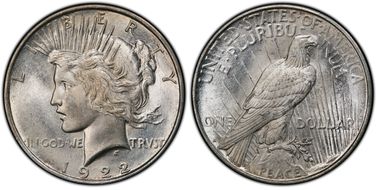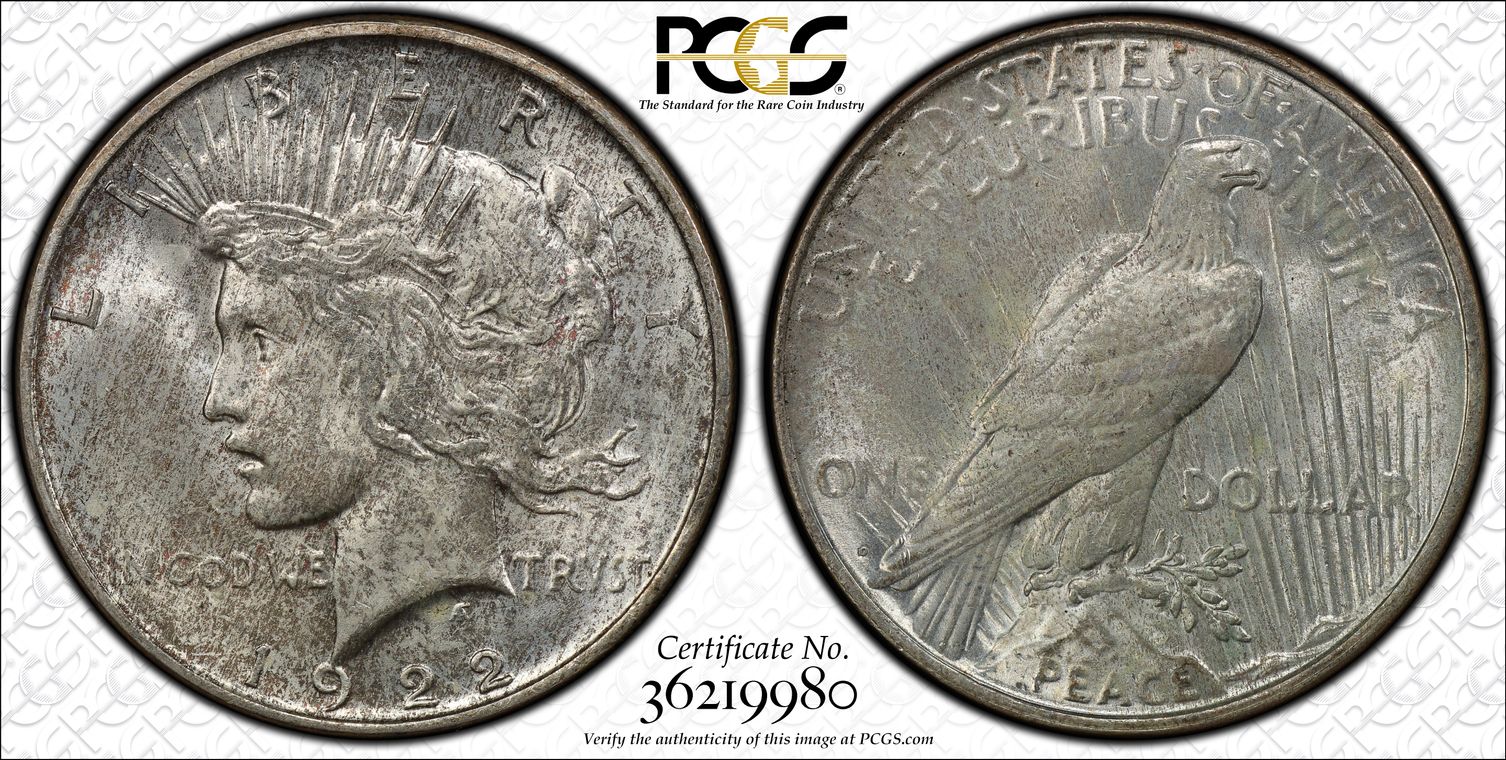1922-D $1 MS64 认证号36219980, PCGS号7358
专家评论
Ron Guth
The 1922-D is the most common of all the Peace Dollars made at the Denver Mint. It's mintage of 15+ million is more than double that of the next closest (1923-D at 6+ million) and almost 12 times that of the lowest mintage Peace Dollar (1927-D). The vast majority of survivors are fairly equally distributed among the MS-63 and MS-64 grades. In MS-65, the 1922-D Peace Dollar becomes scarce. MS-66 examples become very scarce to rare and MS-67 examples are extremely rare.
The strike characteristics of the 1922-D are not as strong as on the P-Mints, and that tends to be true for an D-Mint Peace Dollar. However, fully struck examples are available and are worth a premium over softly struck coins.
According to a notice in the June 1934 issue of The Numismatist (p. 416), collectors could still purchase Uncirculated 1922-D Peace Dollars for "the face value of the coins and an amount sufficient to cover the mail charrges by first-class mail."
Q. David Bowers
The following narrative, with minor editing, is from my "Silver Dollars & Trade Dollars of the United States: A Complete Encyclopedia" (Wolfeboro, NH: Bowers and Merena Galleries, Inc., 1993).Coinage Context
Initial issue: The 1922-D, the first Peace dollar issue struck at the Denver Mint, also had the highest Denver mintage of any date of the design. At the time, the Denver Mint had excellent facilities, was closer to newly-mined silver than Philadelphia, and was the logical mint to strike large quantities of the denomination.
Numismatic Information
Hoard coins: Although many if not most 1922-D dollars were released into circulation during the decade of their mintage, the production quantity was sufficiently large that if even 25% were held back, this amounted to millions of coins. Bags of 1922-D dollars were available on the market in the 1940s and very early 1950s. No one paid much attention to this date, and most languished in bank vaults or were paid out for use in circulation (in the West) or in gambling casinos. Bags of 1,000 Uncirculated coins were still readily available in 1953 and 1954, and wholesaled for about $100 to $150 above face value, but most holders of bags found that even the larger dealers in silver dollars were apt to want to buy just a few rolls at a time.
In the late 1980s and early 1990s a hoard of 50 bags (50,000 coins) began to be marketed. Dwight Manley examined them and found that the average bag of 1,000 coins contained Mint State examples approximately as follows: MS-66: 5 coins; MS-65: 70; MS-64: 200; MS-63: 225; MS-60 to MS-62: 500.(Letter to the author, July 6, 1992.)
John Highfill's Encyclopedia, 1992, p.1145, notes that "Uncirculateds are often heavily bagmarked, well-struck bags are available," which I take to mean that Uncirculated coins, when seen, are often with heavy bagmarks, and that bags of coins (with heavy bagmarks on the coins?) are in existence and contain coins that are well struck.
Circulated grades: The 1922-D is readily available in worn grades up to and including AU. Apparently, most were released into circulation shortly after they were minted. Among worn Peace dollars in VF-20 to AU-58 grades, the 1922-D is the commonest branch mint issue.
Mint State grades: Uncirculated pieces are common, but most exist in lower grade levels from MS-60 to MS-63. Bagmarks are plentiful on typical coins in these grades. MS-64 and MS-65 pieces are harder to find but still constitute the commonest branch mint Peace dollars at these grade levels.
Some coins have a bright-grainy surface (Wayne Miller and John Highfill call it "orange peel") possibly due to die resurfacing with a wire brush, or possibly to die wear. Some dies were employed beyond their useful life; coins struck from these show extensive die breaks, particularly on the obverse.
The striking is usually satisfactory on the obverse, but the reverse is often weak at the center, especially the high parts of the eagle. This was due to the dies being spaced too widely apart, and the metal not completely filling the deepest recesses. As a result, the eagle can be nicked (original planchet marks) while the fields are frosty. Some 1922-D dollars are lightly struck at the bottom of the obverse, including the bottom of the date and the rim area.
Despite the often reiterated common status of the 1922-D, truly aesthetically pleasing, sharply struck coins in MS-65 grade are hard to find, and cherrypicking will pay rewards to the diligent numismatist.
Wayne Miller has seen three or four dozen pieces which would qualify as semi-prooflike with some mirroring of the field, particularly on the reverse. Such pieces should be considered as curiosities rather than true rarities Miller says.
Something to look for: Some specimens exist with the reverse rotated 45° to 50° clockwise from the normal orientation.
Varieties
Circulation strikes:
1. Breen-5716. Hub combinations II-B1 and II-B2.
Micro D mintmark. VAM-1 (hub II-B1). Uncirculateds often heavily bagmarked; sliders are plentiful. VAM-2 (hub I1-B2). VAM-3, as preceding but with minor doubling on olive branch.
Dies prepared: Obverse: Unknown; Reverse: Unknown.
Circulation strike mintage: 15,063,000
Estimated quantity melted: Unknown
Characteristics of striking: Average strike on obverse; reverse often lightly struck at the center. Some specimens are lightly struck at the bottom of the obverse.
Known hoards of Mint State coins: Many bags exist, including a hoard of 50 bags dispensed in the 1990s; commonest branch mint Peace dollar.
Commentary
Most Mint State coins are heavily bagmarked. In Mint State this is the most plentiful Denver Mint dollar of this design type, although high-grade pieces of excellent quality are elusive.
稀有性和存量估计 了解更多
| 所有评级 | 3000000 |
| 60或以上 | 100000 |
| 65或以上 | 7500 |
| 所有评级 | R-1.0 |
| 60或以上 | R-2.0 |
| 65或以上 | R-3.5 |
| 所有评级 | 17 / 23 TIE |
| 60或以上 | 19 / 23 |
| 65或以上 | 19 / 23 |
| 所有评级 | 18 / 24 TIE |
| 60或以上 | 20 / 24 |
| 65或以上 | 20 / 24 |
状况普查 了解更多
|
#1 MS67 PCGS grade
Heritage 8/2015:4229, $39,950 |
|
#1 MS67 PCGS grade
Anne Kate Collection - Stack's/Bowers 8/2018:1235, $90,000 |
| #1 MS67 PCGS grade |
 #4 MS66+ PCGS grade
#4 MS66+ PCGS grade
Larry Shapiro Collection |
| #4 MS66+ PCGS grade |




















